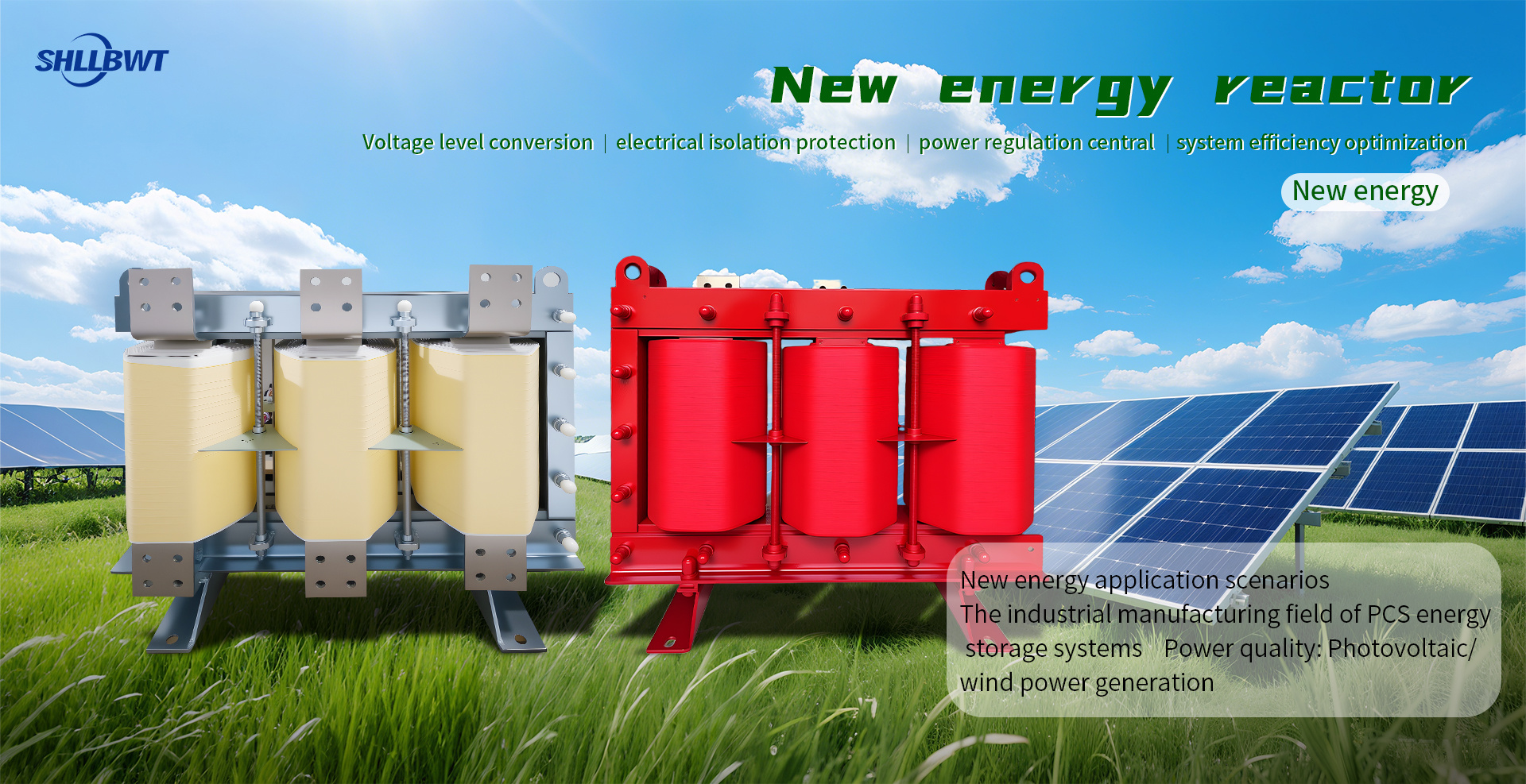undefined
The application and role of reactors in solar power energy and power storage systems
Release time:
2025-08-07

The application and role of reactors in solar power energy and power storage systems
Solar power generation and energy storage systems are important solutions for promoting the development of renewable energy, reducing carbon emissions, and creating a clean and green Earth.They can convert solar energy into electrical energy and store it, providing stable power supply for various applications. Reactors, as basic reactive components, are widely used in such systems, and their application and role directly affect the performance and reliability of the entire system.
Basic Principles and Characteristics of Reactors
A reactor is a basic reactive component composed of a wire coil wound on an electromagnet core. Its main characteristics include energy - storage characteristics and phase - shift characteristics. When alternating current passes through the reactor, the reactor will store energy in its magnetic field. At the same time, the alternating current passing through the reactor will lag behind the voltage, and the phase - shift angle is determined by the ratio between the inductive reactance of the reactor and the circuit impedance.
Application of Reactors in Solar power generation and energy storage system
In Solar power Inverters: Solar power inverters are key components in Solar power power generation systems, which convert direct - current power generated by Solar power panels into alternating - current power. Reactors are used in Solar power inverters to limit harmonic currents and voltage distortion. Inverters usually produce harmonic currents and voltage distortion, and reactors can limit these distortions by impeding harmonic currents, ensuring that the output power meets the grid - connection standards and preventing harmonic interference with other equipment.
In Battery Energy - Storage Systems: Battery energy - storage systems are an important part of Solar power energy - storage systems, which are responsible for storing the surplus electrical energy generated by solar powers. Reactors can be used to control the charging and discharging current of batteries. By limiting the charging and discharging current, the situation of over - loading of the energy - storage system can be prevented, which is crucial for protecting the battery and prolonging its service life. At the same time, reactors can also improve the conversion efficiency of the battery energy - storage system, reducing harmonic losses and suppressing resonance.
4. Role of Reactors in solar power generation and energy storage system
Ensuring Grid Stability: Solar power power generation has the characteristics of intermittency and instability, and the output of electrical energy is easy to fluctuate, which is difficult to meet the stable needs of the grid. Reactors can control the direction and magnitude of the flow of alternating - current electrical energy by changing the inductance of the line. Thereby, they can effectively balance the electrical energy in the grid, reduce the impact on the grid caused by the fluctuation of Solar power power generation, and ensure the stable operation of the grid.
Improving Power Quality: The voltage and frequency of solar power generation and energy storage system fluctuate greatly, which may lead to power quality problems, such as harmonic pollution and voltage fluctuations. Reactors have the functions of filtering and voltage stabilization. They can control the harmonics in the grid, stabilize the voltage, and improve the power quality, ensuring that Solar power power generation can be safely and reliably connected to the grid.
Protecting Power - Generation Equipment: In Solar power generation and energy storage system power generation systems, reactors also play a role in protecting power - generation equipment. When abnormal situations such as over - voltage and over - current occur in the grid, the reactor can limit the impact of these abnormal currents and voltages on the power - generation equipment, prevent equipment damage, and prolong the service life of the equipment.
Enhancing System Reliability: The application of reactors not only improves the stability of the grid and the power quality but also enhances the overall reliability of the Solar power generation and energy storage system power generation system. By regulating the flow direction and magnitude of electrical energy, reactors can ensure that the Solar power power generation system can operate stably under various working conditions, reduce the possibility of failures, and improve the reliability and economy of the system.
Power Factor Correction: Reactors can be used to correct the power factor of the Solar power energy - storage system, making it closer to 1. High power factor is very important for improving system efficiency and reducing harmonic distortion. Reactors, combined with capacitors in the energy - storage system, can comprehensively compensate for reactive power, reduce reactive power consumption, save electrical energy, and reduce system losses.
5. Types and Selection of Reactors
Types of Reactors: According to the structural type, reactors can be divided into air - core reactors, iron - core reactors, and non - inductive reactors. Air - core reactors are wound on a hollow framework, with the advantages of small volume, light weight, and low loss, suitable for high - frequency and small - current occasions. Iron - core reactors are wound on an iron - core framework, with the advantages of large inductance value and small volume, suitable for low - frequency and large - current occasions. Non - inductive reactors are composed of multiple capacitors connected in series and parallel, with no inductance, and have the functions of anti - harmonic and filtering, suitable for occasions with serious harmonic pollution.
Selection Factors: When selecting reactors, factors such as inductance value, current capacity, voltage level, frequency response, iron - core material, heat dissipation, installation form, protection level, and economy should be considered. The inductance value should be determined according to the system requirements to ensure system stability and equipment protection. The current capacity should meet the load current requirements and consider over - current protection. The voltage level should be matched with the system voltage level to ensure the reactor's ability to withstand over - voltage.
6. Conclusion
Reactors play a vital role in Solar power generation and energy storage systempower generation systems. Through their application in different parts of the system, they play important roles in ensuring grid stability, improving power quality, protecting power - generation equipment, etc. With the continuous development of Solar power energy - storage technology, the application of reactors will become more and more extensive. In the future, the research and development of reactors will be more focused on improving efficiency, reducing volume, and adapting to higher - voltage and higher - power systems, providing stronger technical support for the development of Solar power generation and energy storage systempower generation systems.
Related news
undefined


















